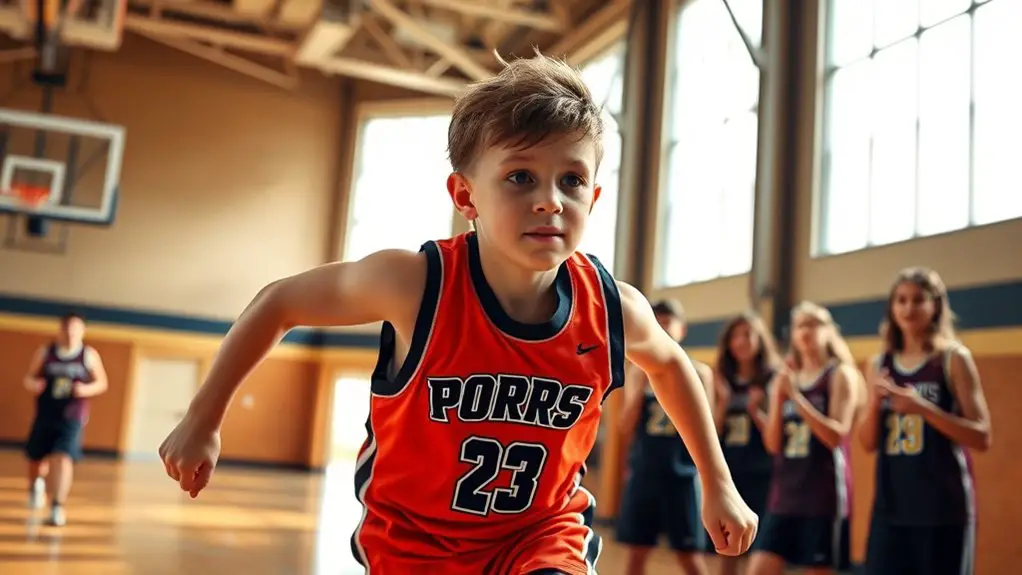Emotional resilience is essential in competitive sports. It helps you handle pressure and bounce back from setbacks, turning challenges into opportunities for growth. Without this resilience, you might struggle with self-doubt and anxiety, which can affect your performance. By developing coping strategies and surrounding yourself with support, you can improve your focus and motivation. Understanding these concepts can enhance your sports journey and overall well-being, while also preparing you for unexpected challenges ahead.
Understanding Emotional Resilience in Sports
Emotional resilience in sports is essential, especially when you consider the intense pressures athletes face. It's not just about physical strength; your mental toughness plays a huge role in your performance. When you're out there, competing against the best, the ability to bounce back from disappointment or stress is vital. You need to trust yourself and your instincts, letting go of any fears that might hold you back.
Understanding emotional resilience means recognizing your emotions and using them to fuel your drive instead of letting them hinder you. It's about embracing the struggle and finding the freedom to grow from it. When you develop this resilience, you'll find that setbacks become opportunities for growth, turning challenges into stepping stones. In sports, it's not just about winning; it's about how you rise, adapt, and thrive, allowing your true potential to shine through. By embracing a growth mindset, you can transform challenges into valuable experiences that enhance your competitive edge.
The Impact of Setbacks on Athlete Performance
Setbacks can hit you hard, both mentally and emotionally, affecting your overall performance. Understanding the psychological effects of loss is essential for bouncing back stronger. Exploring effective coping strategies can help you turn those challenges into opportunities for growth. Additionally, building emotional resilience through reflection on past successes can significantly enhance your ability to face future challenges.
Psychological Effects of Loss
When athletes experience a loss, it can greatly affect their mental state and performance in future competitions. The sting of defeat might lead to self-doubt, anxiety, or even a fear of taking risks in upcoming events. You might find yourself replaying the moments of the loss, wondering what you could've done differently. This mental spiral can hinder your focus and motivation, making it tough to push through training or give your best in the next competition. Furthermore, the pressure to succeed can amplify these feelings, trapping you in a cycle of negativity. Understanding these psychological effects is vital; recognizing them allows you to reclaim your freedom and passion for the sport, helping you navigate the path back to confidence and resilience.
Coping Strategies for Athletes
Although setbacks can feel overwhelming, there are effective coping strategies that athletes can use to regain their focus and motivation. First, embrace the setback as a learning opportunity. Reflect on what went wrong and how you can improve. Next, practice mindfulness techniques, like deep breathing or visualization, to center your thoughts and reduce anxiety. Surround yourself with a supportive network; share your feelings with teammates or coaches who understand. Setting small, achievable goals can also help you regain momentum and a sense of control. Finally, don't forget to celebrate your progress, no matter how small. Remember, resilience isn't just about bouncing back; it's about growing stronger through adversity and rediscovering your passion for the sport you love.
Techniques for Building Emotional Resilience
To build emotional resilience, you can incorporate mindfulness and meditation practices into your routine. These techniques help you stay present and manage stress effectively. Additionally, using positive self-talk can shift your mindset and boost your confidence during challenging moments. Mindfulness practices can also enhance focus and improve your performance under pressure, enabling you to respond calmly in stressful situations.
Mindfulness and Meditation Practices
While engaging in competitive sports can be exhilarating, it often brings about intense pressure and emotional challenges. Mindfulness and meditation practices can help you cultivate emotional resilience, allowing you to thrive under stress. Here are three techniques to incorporate into your routine:
- Breath Awareness: Focus on your breath for a few minutes daily. It grounds you and promotes relaxation, helping you stay centered during competitions.
- Body Scan: Take a moment to mentally check in with your body, noticing areas of tension. This practice helps release stress and increases body awareness.
- Visualization: Imagine yourself succeeding in your sport. This mental rehearsal builds confidence and prepares you emotionally for real-life challenges.
Positive Self-Talk Techniques
When you face the pressures of competitive sports, cultivating a habit of positive self-talk can greatly enhance your emotional resilience. Start by recognizing negative thoughts and replacing them with empowering affirmations. Instead of "I can't do this," try saying, "I've trained for this moment." Visualize your success and remind yourself of past victories to boost your confidence. Use simple, direct phrases like "I'm strong" or "I'm capable" during tough moments to keep your spirit high. Surround yourself with positive influences, whether it's teammates or inspirational quotes. Remember, the conversation you have with yourself shapes your mindset. By consistently practicing positive self-talk, you'll build the emotional strength needed to thrive in competitive environments and embrace the freedom to perform at your best.
The Role of Mental Training in Sports
Mental training plays an essential role in enhancing athletes' performance, as it equips them with the tools to manage pressure and emotions during competition. It allows you to develop a mindset that can withstand the challenges of your sport. Here are three key components of mental training that can elevate your game:
- Visualization: Picture yourself succeeding. This technique helps you prepare mentally for various scenarios, allowing you to react confidently when it counts.
- Mindfulness: Practice staying present. Being aware of your thoughts and feelings can help you regain focus and reduce anxiety during high-stakes moments.
- Goal Setting: Establish clear, achievable goals. These provide direction and motivation, helping you stay committed even when facing setbacks. Additionally, incorporating techniques to improve focus and concentration can further enhance your mental resilience and performance in competitive situations.
Real-Life Examples of Resilient Athletes
Resilience is a defining trait of many successful athletes, showcasing their ability to overcome challenges and setbacks. Take, for instance, Serena Williams, who faced numerous injuries and personal struggles yet returned to dominate the tennis world. Her determination to bounce back inspires countless fans. Then there's Michael Jordan, who was cut from his high school basketball team. Instead of giving up, he worked harder, ultimately becoming one of the greatest players in history.
And don't forget about Bethany Hamilton, who lost her arm in a shark attack but didn't let that define her. Instead, she became a professional surfer, embodying the spirit of resilience. These athletes remind you that setbacks are merely stepping stones to success. They teach you to embrace hardships, push through adversity, and emerge stronger. Their stories can light a fire within you, encouraging you to pursue your dreams, no matter the obstacles. By employing mental preparation techniques, they effectively manage stress and enhance their performance in high-pressure situations.
The Long-Term Benefits of Emotional Resilience in Sports
Although many athletes focus on physical training, developing emotional resilience offers substantial long-term benefits that extend beyond the playing field. When you cultivate this resilience, you not only enhance your performance but also enrich your life in various ways. Here are three key benefits:
- Enhanced Decision-Making: With emotional resilience, you're better equipped to make quick, clear decisions under pressure, helping you seize opportunities when they arise.
- Improved Relationships: A resilient mindset fosters healthier connections with teammates and coaches, promoting a supportive environment that can drive collective success.
- Sustainable Motivation: Emotional resilience keeps your passion alive, allowing you to push through challenges and setbacks without losing sight of your goals. Additionally, practicing mindfulness techniques can further enhance your ability to stay focused and calm during high-pressure situations.
Frequently Asked Questions
How Does Emotional Resilience Differ From Mental Toughness?
Emotional resilience is your ability to bounce back from setbacks, while mental toughness focuses on enduring challenges. You'll find that resilience involves understanding emotions, whereas toughness emphasizes persistence and strength in the face of adversity.
Can Emotional Resilience Be Measured Objectively?
Imagine a river flowing freely, yet its depth can't be seen. Similarly, emotional resilience isn't easily measured. It's felt through experiences, not numbers. You can gauge its effects, but quantifying it remains elusive.
What Role Do Coaches Play in Developing Resilience?
Coaches play an essential role in developing your resilience. They provide guidance, support, and constructive feedback, helping you navigate challenges. With their encouragement, you'll learn to adapt, persevere, and thrive under pressure, enhancing your overall performance.
Are There Age-Related Differences in Emotional Resilience Among Athletes?
You'd think emotional resilience is the same for all ages, but younger athletes often struggle more. As you grow, you learn to cope better, transforming those challenges into strengths. Age does make a difference, after all!
How Can Parents Support Their Child's Emotional Resilience in Sports?
To support your child's emotional resilience in sports, encourage open communication, provide a safe space for expression, and focus on effort rather than outcomes. Celebrate their achievements, helping them learn from setbacks without fear of judgment.




